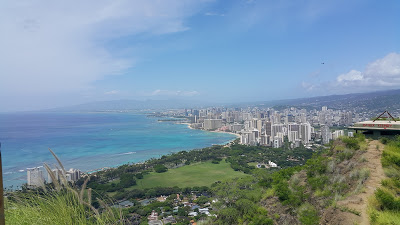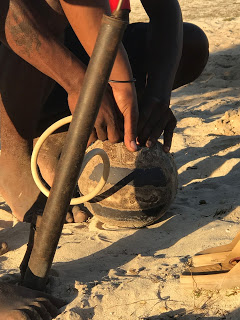or: Sport – the other international language
Every afternoon, many of the men from the local village in Madagascar (where I am at the moment) gather for some serious business. They are not the village elders. They are a younger group. Their meeting ground is heavily compacted sand located in front of the Italian Hospital.
They carefully delineate the boundaries in the sand through shuffling their bare feet to form a large rectangle, careful to keep the high net in the centre. Two teams of five self-select before choosing an area either side of the net to occupy. The remainder sit on the sidelines, but they are not merely bystanders.
Their role is important.
They impact the game and the atmosphere.
They are the sideline callers and decide crucial facts whether a ball is in or out. They are not to be argued with and their ruling is final. They provide moral support and good natured jeering for both teams. They don’t appear to support one team over the other, possibly because the team participants change so frequently.
The sideline callers can (and frequently do) override the main umpire who also happens to be the scorer. Score is kept written in the sand, in front of the umpire, with the previous number brushed over and the new one added. From time to time, they may yell out the score in either French, Malagasy, Italian or English depending on who it is, their language ability and who may be interested in the score. This role is also self-selected.
The well-worn ball is then pumped up (this happens a few times within the game itself) and thrown to one of the teams to serve.
With the game in motion, it is very vocal. There is a bit of entertaining swagger, staring down and even some football techniques used with the ball going over the net in almost anyway possible. When there is a particularly good or bad shot, the person making it is either congratulated or teased by their own team, the opposition and those on the sideline. It is merciless yet done in a very good natured way so that no-one takes it personally. Everyone laughs and the laughing is genuine.
Even the umpire / scorer may be made fun of and teased for either how they say the numbers in other languages, their scoring technique or their (in)ability to score correctly or determine if the ball is in / out.
After the first game, the winning team stays on the court to serve first the following game. The challenging team self selects and joins them on court.
Given their expertise at volleyball (or is it home ground advantage?) it is no surprise that when a group of our volunteers challenges, they come off second best – we haven’t spent that amount of time practicing. That said, it is all done in such good spirit and with such joviality, that no-one feels badly for having lost.
The overall winners yesterday displayed impressive athleticism and coordination. Each member of that team had a distinct job with one being exceptional at the net and others being fantastic at placing the ball in exactly the right place. They knew each others’ strengths and played to those. Missing the shot, infectious laughter distributed itself across the teams, to the sidelines. There was rolling around on the court from laughing so hard. There was also rolling around on the court from trying to reach the ball.
As the sun set, all rose to walk back into the village, spirits light as bantering continued. I unknowingly dropped my hat at one stage and a Malagasy man ran up behind me, held it out and and we had a brief conversation in Malagasy (my understanding after a week is very small though improving as we all introduced ourselves and said five sentences to the village elders earlier in the week) as we continued on our way.
Very entertaining afternoon, a great display of true sportsmanship and demonstration of language being fairly immaterial to communication.
* Thanks to New Order for the title to this post.


